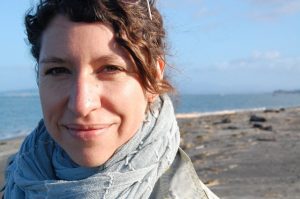

Thursday, March 3, 2022
12:00 – 1:00 p.m.
In-person: 3rd Floor, Dodson Room 302 at IKBLC
Online: via Zoom
Registration is required. Please complete the form below.
Abstract
Relational Technologies exist in constellations of kinship among human and non-human partners (Lewis et al 2018); they connect us more deeply to each other, and to the places we inhabit. They hold ground amid the seemingly ubiquitous and invisible artificial intelligences, machine-learning models, data-mining, and algorithmic paradigms that iteratively colonize our virtual worlds via extraction and surveillance.
In this presentation, Gaertner and Rosenblum introduce CEDaR space (Community Engaged Documentation and Research), a CFI-funded lab at UBC-V within the Institute for Critical Indigenous Studies. Designed as a sandbox for creating Relational Technologies through collaborative community-led prototyping, CEDaR facilitates the development of digital technologies and workflows for gathering, sharing, and stewarding culture. Facilities in the space include a soundbooth; high capacity workstations equipped for photogrammetry, game design, and xR development; an immersive audio and video projection system; and a 3D printer. Within CEDaR, the Relational Technologies Research Cluster supports the collaborative development of new media methodologies, such as mapping, gaming, and digital curation to nourish and reinforce linguistic, cultural, and territorial sovereignties through immersive storytelling.
Gaertner and Rosenblum will also present a beta version of one of these technologies: the hən̓q̓əmin̓əm̓ Street Signs Audio app, produced in collaboration with Musqueam Language and Culture and the Emerging Media Lab. This geolocated installation allows users at the UBC-V campus on Musqueam territory to hear Vanessa Campbell, of the Musqueam Language and Culture Department, speak the street names in hən̓q̓əmin̓əm̓ visible at various intersections, accompanied by a rich soundscape which reflects the particulars of place embedded in the grammar of a word like stəywət, the name for Lower Mall, which describes the experience of walking close to the shoreline and feeling a westerly wind off the Salish Sea. An Augmented Reality-assisted Geolocative Audio platform underlies the hən̓q̓əmin̓əm̓ Street Signs project and extends its potential to other projects in development, such as a site-specific poetry project led by Fiona Lam, Vancouver’s poet laureate. We will describe how this project has informed our thinking about agile development, data management, documentation, access, and intellectual property, presenting one model for how community protocols can inform the ethical care and stewardship of cultural knowledge within and between embodied and digital contexts.
Speaker Bio


David Gaertner is an Assistant Professor at the Institute for Critical Indigenous Studies and the Co-Director of CEDaR. He is a white settler of German descent, trained as a scholar of Indigenous literatures. His research focuses on new media and digital storytelling, more recently with an emphasis on gaming. He is the author of The Theatre of Regret: Literature, Art and the Politics of Reconciliation in Canada and the editor of Sôhkêyihta: The Poetry of Sky Dancer Louise Bernice Halfe. He is currently co-editing a book on Indigenous Twitter for Wilfrid Laurier UP.


Registration form
Please complete the following form to register for this event. You will receive an email with the Zoom meeting link after submitting your details. If you didn’t receive it, please check the spam folder in your inbox. If you have any questions, please contact us at ischool.comms@ubc.ca.
Registration is now closed.


